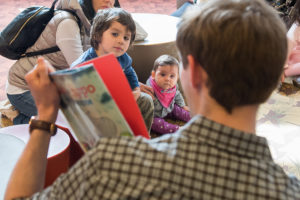|
We All Have a Role to Play in Closing the 30-Million-Word Gap By Janice Bojda, Youth Services Manager
What’s important about these programs is the intergenerational experiences they foster beyond entertainment. They underscore the fact that parents and guardians need to consistently engage with their children to build literacy and vocabulary development. Storytelling and storytime are opportunities to do that. The Evanston Public Library is continuously committed to developing literacy and vocabulary skills in every Evanstonian. The library only plays an additive role in child literacy and vocabulary development to the one-on-one impact adults have on children. Study after study shows children who don’t have regular adult interaction are, by age five, exposed to 30 million fewer words than children who do. That has a negative impact on learning and school performance. Via the Early Childhood Education Journal (2004), a Rubin & Wilson study focused on storytelling and story time in providing children the opportunity to “play with language, while gaining an appreciation of the sounds and meanings of words.” Talking and singing during story time also drive linguistic development because it’s the interaction that augments the learning. Other research shows interactive, read-aloud styles and adult assistance in word learning are most effective in enhancing word learning. Other adult interactions that strengthen literacy and vocabulary include when an adult presents concrete objects that represent the words, when children are provided multiple opportunities to use the book-related words, and open-ended questions that engage the child in conversations about the book and activities. Studies show when adults engage children this way the children score significantly better on both vocabulary tests and other measures of language. Our programs inside and outside of the library help children develop. But to close the 30-million-word gap, consistent storytelling and storytime are key opportunities for parents and guardians to engage with their children. Janice Bojda has been with the Evanston Public Library for more than 22 years. The library was founded in 1873 and serves a highly diverse and evolving community. More than 1,600 people use its resources and services every day. |
Today a reader, tomorrow a leader.

 October represents a high point in the Evanston Public Library’s storytelling calendar. The third annual Storytelling Festival took us to new lands through a diversity of imaginations. We celebrated the results of our Summer Reading Program, which gained steam versus 2016 in our effort to foster lifelong literacy and prevent learning losses. And importantly, we re-engaged our youngest readers across our varied storytelling programs.
October represents a high point in the Evanston Public Library’s storytelling calendar. The third annual Storytelling Festival took us to new lands through a diversity of imaginations. We celebrated the results of our Summer Reading Program, which gained steam versus 2016 in our effort to foster lifelong literacy and prevent learning losses. And importantly, we re-engaged our youngest readers across our varied storytelling programs.